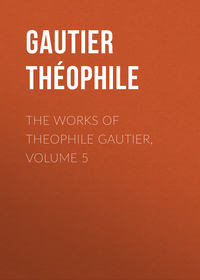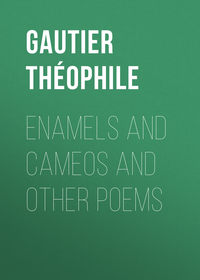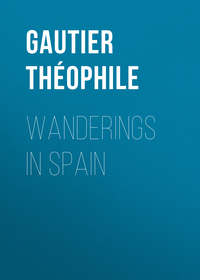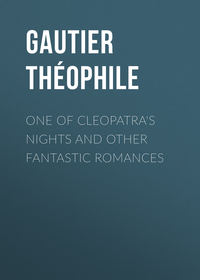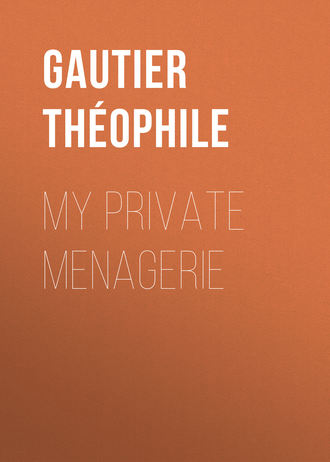 полная версия
полная версияMy Private Menagerie
A terrific thunder-clap, louder than the report of a hundred guns, followed almost instantaneously upon the flash, and the shock was so violent that I was nearly thrown to the ground.
The storm passed away shortly after that frightful explosion, but, on reaching the arbour, I found the thirty-two rats, toes up, killed by the one and same stroke of lightning. No doubt the iron wires of their cage had attracted the electric fluid and acted as a conductor.
Thus died together, as they had lived, the thirty-two Norway rats, – an enviable death, not often vouchsafed by fate!
III
THE BLACK DYNASTY
Don Pierrot of Navarre, being a native of Havana, required a hot-house temperature, and he enjoyed it in the house; round the dwelling, however, stretched great gardens, separated by open fences through which a cat could easily make its way, and rose great trees in which twittered, warbled, and sang whole flocks of birds; so that sometimes Pierrot, profiting by a door left open, would go out at night and start on a hunt, rambling through the grass and flowers wet with dew. In such cases he would have to await daylight to be let in, for although he would come and miaoul under our windows, his appeals did not always awaken the sleepers in the house. He had a delicate chest, and one night, when it was colder than usual, he caught a cold which soon turned into consumption. After coughing for a whole year poor Pierrot became thin and emaciated, and his coat, formerly so silky, had the mat whiteness of a shroud. His great transparent eyes had become the most important feature in his poor shrunken face; his red nose had turned pale, and he walked with slow steps, in a melancholy fashion, by the sunny side of the wall, watching the yellow autumn leaves whirling and twisting. One could have sworn he was reciting to himself Millevoye’s elegy. A sick animal is a very touching object, for it bears suffering with such gentle and sad resignation. We did all we could to save him; I called in a very skilful physician who tested his chest and felt his pulse. Ass’s milk was prescribed, and the poor little creature drank it willingly enough out of his tiny china saucer. He would remain for hours at a time stretched out on my knee like the shadow of a sphinx; I could feel his vertebræ like the grains of a chaplet, and he would try to acknowledge my caresses with a feeble purr that sounded like a death-rattle. On the day he died, he lay on his side gasping, but got himself up by a supreme effort, came to me, and opening wide his eyes, fixed upon me a glance that called for help with intense supplication. He seemed to say to me, “You are a man; do save me.” Then he staggered, his eyes already glazed, and fell to the ground, uttering so woeful, so despairing, so anguished a cry that it filled me with mute horror. He was buried at the foot of the garden, under a white rosebush that still marks the place of his tomb.
Séraphita died two or three years later, of croup, which the physician was unable to master. She rests not far from Pierrot.
With her ended the White Dynasty, but not the family. From that pair of snow-white cats had sprung three coal-black kittens, a mystery the solution of which I leave to others. Victor Hugo’s “Les Misérables” were then all the rage, and the names of the characters in the novel were in every one’s mouth. The two little male cats were called Enjolras and Gavroche, and the female Eponine. They were the sweetest of kittens, and we trained them to fetch and carry pieces of paper thrown at a distance just as a dog would do. We got so far as to throw the paper ball on the top of wardrobes, or to hide it behind boxes or in tall vases, and they would retrieve it very prettily with their paws. On attaining years of discretion, they forsook these frivolous sports and resumed the dreamy, philosophical calm which is the real characteristic of cats.
All negroes are alike to people who land in a slave-owning country in America, and it is impossible for them to tell one from another. So, to those who do not care for them, three black cats are three black cats and nothing more. But an observing eye makes no such mistake. The physiognomies of animals are as different as those of men, and I could always tell to which particular cat belonged the black face, as black as Harlequin’s mask, and lighted by emerald disks with golden gleams.
Enjolras, who was by far the handsomest of the three, was marked by his big lion-like head and well whiskered cheeks, by his muscular shoulders, his long back, and his splendid tail, fluffy as a feather duster. There was something theatrical and grandiloquent about him, and he seemed to pose like an actor who attracts admiration. His motions were slow, undulating, and full of majesty; he seemed to be always stepping on a table covered with china ornaments and Venetian glass, so circumspectly did he select the place where he put down his foot. He was not much of a Stoic, and exhibited a liking for food which his namesake would have had reason to blame. No doubt Enjolras, the pure and sober youth, would have said to him, as the angel did to Swedenborg, “You eat too much.” We rather encouraged this amusing voracity, analogous to that of monkeys, and Enjolras grew to a size and weight very uncommon among domestic cats. Then I bethought myself of having him shaved in the style of poodles, in order to bring out completely his leonine appearance. He retained his mane and a long tuft of hair at the end of the tail, and I would not swear that his thighs were not adorned with mutton-chop whiskers like those Munito used to wear. Thus trimmed, he resembled, I must confess, a Japanese monster much more than a lion of the Atlas Mountains or the Cape. Never was a more extravagant fancy carried out on the body of a living animal; his closely clipped coat allowed the skin to show through, and its bluish tones, most curious to note, contrasted strangely with his black mane.
Gavroche was a cat with a sharp, satirical look, as if he intended to recall his namesake in the novel. Smaller than Enjolras, he was endowed with abrupt and comical agility, and in the stead of the puns and slang of the Paris street-Arab, he indulged in the funniest capers, leaps, and attitudes. I am bound to add that, yielding to his street instincts, Gavroche was in the habit of seizing every opportunity of leaving the drawing-room and going off to join, in the court, and even in the public streets, numbers of wandering cats, “of unknown blood and lineage low,” with whom he took part in performances of doubtful taste, completely forgetful of his dignified rank as a Havana cat, the son of the illustrious Don Pierrot of Navarre, a grandee of Spain of the first class, and of the Marchioness Séraphita, noted for her haughty and aristocratic manners.
Sometimes he would bring in to his meals, in order to treat them, consumptive friends of his, so starved that every rib in their body showed, having nothing but skin and bones, whom he had picked up in the course of his excursions and wanderings, for he was a kind-hearted fellow. The poor devils, their ears laid back, their tails between their legs, their glance restless, dreading to be driven from their free meal by a housemaid armed with a broom, swallowed the pieces two, three, and four at a time, and like the famous dog, Siete Aguas (Seven Waters), of Spanish posadas, would lick the platter as clean as if it had been washed and scoured by a Dutch housekeeper who had served as model to Mieris or Gerard Dow. Whenever I saw Gavroche’s companions, I remembered the lettering under one of Gavarni’s drawings: “A nice lot, the friends you are capable of proceeding with!” But after all it was merely a proof of Gavroche’s kindness of heart, for he was quite able to polish off the plateful himself.
The cat who bore the name of the interesting Eponine was more lissome and slender in shape than her brothers. Her mien was quite peculiar to herself, owing to her somewhat long face, her eyes slanting slightly in the Chinese fashion, and of a green like that of the eyes of Pallas Athene, on whom Homer invariably bestows the title of γλαυκῶπις, her velvety black nose, of as fine a grain as a Perigord truffle, and her incessantly moving whiskers. Her coat, of a superb black, was always in motion and shimmered with infinite changes. There never was a more sensitive, nervous, and electric animal. If she were stroked two or three times, in the dark, blue sparks came crackling from her fur. She attached herself to me in particular, just as in the novel Eponine becomes attached to Marius. As I was less taken up with Cosette than that handsome youth, I accepted the love of my affectionate and devoted cat, who is still the assiduous companion of my labours and the delight of my hermitage on the confines of the suburbs. She trots up when she hears the bell ring, welcomes my visitors, leads them into the drawing-room, shows them to a seat, talks to them – yes, I mean it, talks to them – with croonings and cooings and whimpers quite unlike the language cats make use of among themselves, and which simulate the articulate speech of man. You ask me what it is she says? She says, in the plainest possible fashion: “Do not be impatient; look at the pictures or chat with me, if you enjoy that. My master will be down in a minute.” And when I come in she discreetly retires to an arm-chair or on top of the piano, and listens to the conversation without breaking in upon it, like a well-bred animal that is used to society.
Sweet Eponine has given us so many proofs of intelligence, kindly disposition, and sociability that she has been promoted, by common consent, to the dignity of a person, for it is plain that a higher order of reason than instinct guides her actions. This dignity entails the right of eating at table like a person, and not from a saucer in a corner, like an animal. So Eponine’s chair is placed beside mine at lunch and dinner, and on account of her size she is allowed to rest her fore paws upon the edge of the table. She has her own place set, without fork or spoon, but with her glass. She eats of every course that is brought on, from the soup to the dessert, always waiting for her turn to be served and behaving with a discretion and decency that it is to be wished were more frequently met with in children. She turns up at the first sound of the bell, and when we enter the dining-room we are sure to find her already in her place, standing on her chair, her paws on the edge of the table, and holding up her little head to be kissed, like a well-bred young lady who is polite and affectionate towards her parents and her elders.
The sun has its spots, the diamond its flaws, and perfection itself its little weak points. Eponine, it must be owned, has an overmastering fondness for fish, a taste she shares in common with all her race. The Latin proverb, Catus amat pisces, sed non vult tingere plantas, to the contrary notwithstanding, she is always ready to pop her paw into the water to fish out a blay, a small carp, or a trout. Fish makes her well-nigh delirious, and like children eagerly looking for the dessert, she is apt to object to the soup, when the preliminary investigations she has carried on in the kitchen have enabled her to ascertain that the fish has duly come in and that there is no reason why Vatel should run himself through with his sword. In such cases we do not help her to fish, and I remark to her, in a cold tone, “A lady who has no appetite for soup cannot have any appetite for fish,” and the dish is remorselessly sent past her. Then seeing that it is no joking matter, dainty Eponine bolts her soup in hot haste, licks up the very last drop of the bouillon, puts away the minutest crumb of bread or Italian paste, and turns round to me with the proud look of one conscious of being without fear or reproach and of having fulfilled her duty. Her share of the fish is handed to her, and she despatches it with every mark of extreme satisfaction. Then, having tasted a little of every dish, she winds up her meal by drinking one-third of a glassful of water.
If we happen to have guests at dinner, Eponine does not need to have seen them enter to be aware that there is to be company. She simply looks at her place, and if she sees a knife, fork, and spoon laid there, she makes off at once and perches on the piano stool, her usual place of refuge in such cases. Those who deny reasoning powers to animals may explain this fact, so simple apparently, yet so suggestive, as best they may. That judicious and observant cat of mine deduces from the presence by her plate of utensils which man alone understands how to use that she must give up her position for that day to a guest, and she forthwith does so. Never once has she made a mistake. Only, when she is well acquainted with the particular guest, she will climb upon his knee and seek, by her graceful ways and her caresses, to induce him to bestow some tit-bit upon her.
But enough of this; I must not weary my readers, and stories of cats are less attractive than stories about dogs. Yet I deem that I ought to tell of the deaths of Enjolras and Gavroche. In the Latin Rudiments there is a rule stated thus: Sua eum perdidit ambitio. Of Enjolras it may be said: Sua eum perdidit pinguitudo, that is, his admirable condition was the cause of his death. He was killed by idiotic fanciers of jugged hare. His murderers, however, perished before the end of the year in the most painful manner; for the death of a black cat, an eminently cabalistic animal, never goes unavenged.
Gavroche, seized with a frantic love of freedom, or rather with a sudden attack of vertigo, sprang out of the window one day, crossed the street, climbed the fence of the Parc Saint-James, which faces our house, and vanished. In spite of our utmost endeavours, we never managed to hear of him again, and a shadow of mystery hangs over his fate; so that the only survivor of the Black Dynasty is Eponine, who is still faithful to her master and has become a thorough cat of letters.
Her companion now is a magnificent angora cat, whose gray and silver fur recalls Chinese spotted porcelain. He is called Zizi, alias “Too Handsome to Work.” The handsome fellow lives in a sort of contemplative kief, like a theriaki under the influence of the drug, and makes one think of “The Ecstasies of Mr. Hochenez.” Zizi is passionately fond of music, and, not satisfied with listening to it, he indulges in it himself. Sometimes, in the dead of night, when everybody is asleep, a strange, fantastic melody, which the Kreislers and the musicians of the future might well envy, breaks in upon the silence. It is Zizi walking upon the key-board of the piano which has been left open, and who is at once astonished and delighted at hearing the keys sing under his tread.
It would be unjust not to link with this branch Cleopatra, Eponine’s daughter, whose shy disposition keeps her from mingling in society. She is of a tawny black, like Mummia, Atta-Croll’s hairy companion, and her two green eyes look like huge aqua-marines. She generally stands on three legs, her fourth lifted up like a classical lion that has lost its marble ball.
These be the chronicles of the Black Dynasty. Enjolras, Gavroche, and Eponine recall to me the creations of a beloved master; only, when I re-read “Les Misérables,” the chief characters in the novel seem to me to be taken by black cats, a fact that in no wise diminishes the interest I take in it.
IV
THIS SIDE FOR DOGS
I have often been charged with not being fond of dogs; a charge which does not at first sight appear to be very serious, but which I nevertheless desire to clear myself of, for it implies a certain amount of dislike. People who prefer cats are thought by many to be cruel, sensuous, and treacherous, while dog-lovers are credited with being frank, loyal, and open-hearted, – in a word, possessed of all the qualities attributed to the canine race. I in no wise deny the merits of Médor, Turk, Miraut, and other engaging animals, and I am prepared to acknowledge the truth of the axiom formulated by Charlet, – “The best thing about man is his dog.” I have been the owner of several, and I still own some. Should any of those who seek to discredit me come to my house, they would be met by a Havana lap-dog barking shrilly and furiously at them, and by a greyhound that very likely would bite their legs for them. But my affection for dogs has an understratum of fear. These excellent creatures, so good, so faithful, so devoted, so loving, may go mad at any moment, and then they become more dangerous than a lance-head snake, an asp, a rattlesnake or a cobra capella. This reacts on my love for dogs. Then dogs strike me as a bit uncanny; they have such a searching, intense glance; they sit down in front of you with so questioning a look that it is fairly embarrassing. Goethe disliked that glance of theirs that seems to attempt to incorporate man’s soul within itself, and he drove away dogs, saying, “You shall not swallow my monad, much as you may try.”
The Pharamond of my canine dynasty was called Luther. He was a big white spaniel, with liver spots, and handsome brown ears. He was a setter, had lost his owner, and after looking for him a long time in vain, had taken to living in my father’s house at Passy. Not having partridges to go after, he had taken to rat-hunting, and was as clever at it as a Scotch terrier. At that time I was living in that blind alley of the Doyenné, now destroyed, where Gérard de Nerval, Arsène Houssaye and Camille Rogier were the heads of a little picturesque and artistic Bohemia, the eccentric mode of life in which has been so well told by others that it is unnecessary to relate it over again. There we were, right in the centre of the Carrousel, as independent and solitary as on a desert island in Oceanica, under the shadow of the Louvre, among the blocks of stone and the nettles, close to an old ruinous church, with fallen-in roof which looked most romantic in the moonlight. Luther, with whom I was on a most friendly footing, seeing that I had finally abandoned the paternal nest, made a point of coming to see me every morning. He started from Passy, no matter what the weather was, came down the Quai de Billy, the Cours-la-Reine, and reached my place at about eight o’clock, just as I was waking. He used to scratch at the door, which was opened for him, and he dashed joyously at me with yelps of joy, put his paws on my knees, received with a modest and unassuming air the caresses his noble conduct merited, took a look round the room, and started back to Passy. On arriving there, he went to my mother, wagged his tail, barked a little, and said as plainly as if he had spoken: “I have seen young master; don’t worry; he is all right.” Having thus reported to the proper person the result of his self-imposed mission, he would drink up half a bowlful of water, eat his food, lie down on the carpet by my mother’s chair, – for he entertained peculiar affection for her, – and sleep for an hour or two after his long run. Now, how do people who maintain that animals do not think and are incapable of putting two and two together explain this morning visit, which kept up family relations and brought to the home-nest news of the fledgeling that had so recently left it?
Poor Luther’s end was very sad. He became taciturn, morose, and one fine morning bolted from the house, feeling the rabies on him and resolved not to bite his masters; so he fled, and we have every reason to believe that he was killed as a mad dog, for we never saw him again.
After a pretty long interregnum a new dog was brought into the house. It was called Zamore, and was a sort of spaniel, of very mixed breed, small in size, with a black coat, save the tan spots over his eyes and the tan hair on his stomach. On the whole he was insignificant physically, and ugly rather than handsome; but morally, he was a remarkable dog. He absolutely despised women, would not obey them, never would follow them, and never once did my mother or my sisters manage to win from him the least sign of friendship or deference. He would accept their attentions and the tit-bits they gave him with a superior air, but never did he express any gratitude for them. Never would he yelp, never would he rap the floor with his tail, never bestow on them a single one of those caresses dogs are so fond of lavishing. He remained impassible in a sphinx-like pose, like a serious man who will not take part in the conversation of frivolous persons. The master he had elected was my father, in whom he acknowledged the authority of the head of the house, and whom he considered a mature and serious man. But his affection for him was austere and stoical, and was not shown by gambadoes, larks, and lickings. Only, he always kept his eyes upon him, followed his every motion and kept close to heel, never allowing himself the smallest escapade or the least nod to any passing comrades. My dear and lamented father was a great fisherman before the Lord, and he caught more barbels than Nimrod ever slew antelopes. It certainly could not be said of his fishing-rod that it was a pole and string with a worm at one end and a fool at the other, for he was a very clever man, and none the less he daily filled his basket with fish. Zamore used to accompany him on his trips, and during the long night-watches entailed by ground-line fishing for the big fellows, he would stand on the very edge of the water, apparently trying to fathom its dark depths and to follow the movements of the prey. Although he often pricked up his ears at the faint and distant sounds that, at night, are heard in the deepest silence, he never barked, having understood that to be mute is a quality indispensable in a fisherman’s dog. In vain did Phœbe’s alabaster brow show above the horizon reflected in the sombre mirror of the river; Zamore would not bay at the moon, although such prolonged ululation gives infinite delight to creatures of his species. Only when the bell on the set-line tinkled did he look at his master and allow himself one short bark, knowing that the prey was caught; and he appeared to take the greatest interest in the manœuvres involved in the landing of a three or four pound barbel.
No one would have suspected that under his calm, abstracted, philosophical look, this dog, so serious that he was almost melancholy, and despised all frivolity, nursed an overmastering, strange, never to be suspected passion, absolutely contrary to his apparent moral and physical character.
“You do not mean,” I hear my reader exclaim, “that the good Zamore had hidden vices? – that he was a thief?” No. “A libertine?” No. “That he loved brandied cherries?” No. “That he bit people?” Never. Zamore was crazy about dancing. He was an artist devoted to the choregraphic art.
He became conscious of his vocation in the following manner. One day there appeared on the square at Passy a gray moke, with sores on its back, and drooping ears, one of those wretched mountebanks’ asses that Decamps and Fouquet used to paint so well. The two baskets balanced on either side of his raw and prominent backbone contained a troupe of trained dogs, dressed as marquesses, troubadours, Turks, Alpine shepherdesses, or Queens of Golconda, according to their sex. The impresario put down the dogs, cracked his whip, and suddenly every one of the actors forsook the horizontal for the perpendicular position, and transformed itself into a biped. The drum and fife started up and the ballet commenced.
Zamore, who was gravely idling around, stopped smitten with wonder at the sight. The dogs, dressed in showy colours, braided with imitation gold lace on every seam, a plumed hat or a turban on their heads, and moving in cadence to a witching rhythm, with a distant resemblance to human beings, appeared to him to be supernatural creatures. The skilfully linked steps, the slides, the pirouettes delighted but did not discourage him. Like Correggio at the sight of Raphael’s painting, he exclaimed in his canine speech, Anch’ io son pittore! and when the company filed past him, he also, filled with a noble spirit of emulation, rose up, somewhat uncertainly, upon his hind legs and attempted to join them, to the great delight of the onlookers.
The manager did not see it in that light, and let fly a smart cut of his whip at Zamore, who was driven from the circle, just as a spectator would be ejected from the theatre did he, during the performance, take on himself to ascend to the stage and to take part in the ballet.




